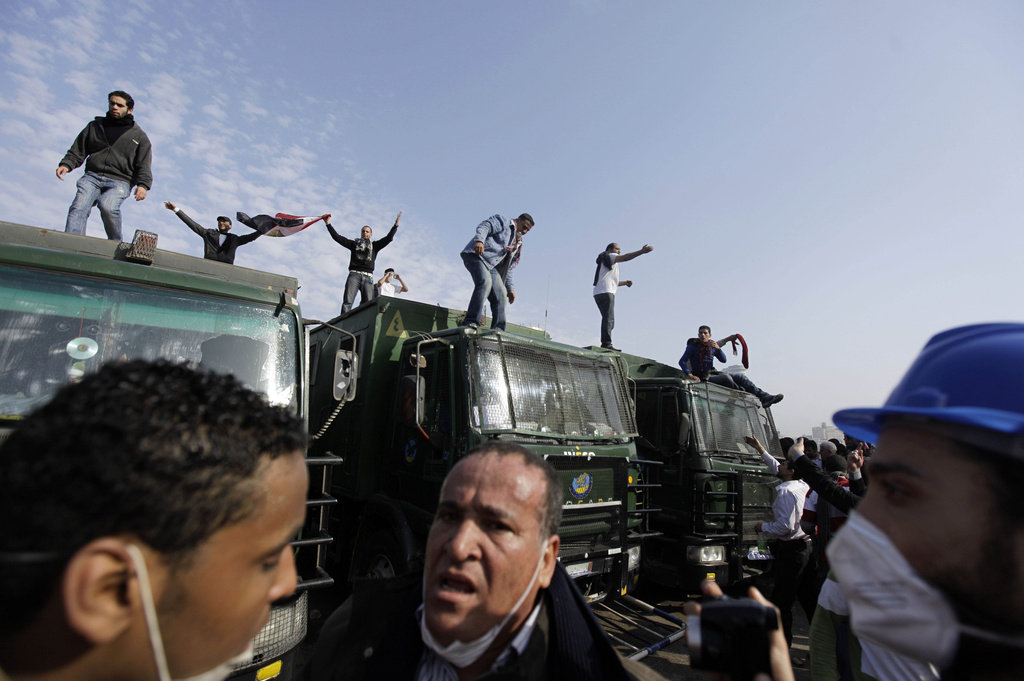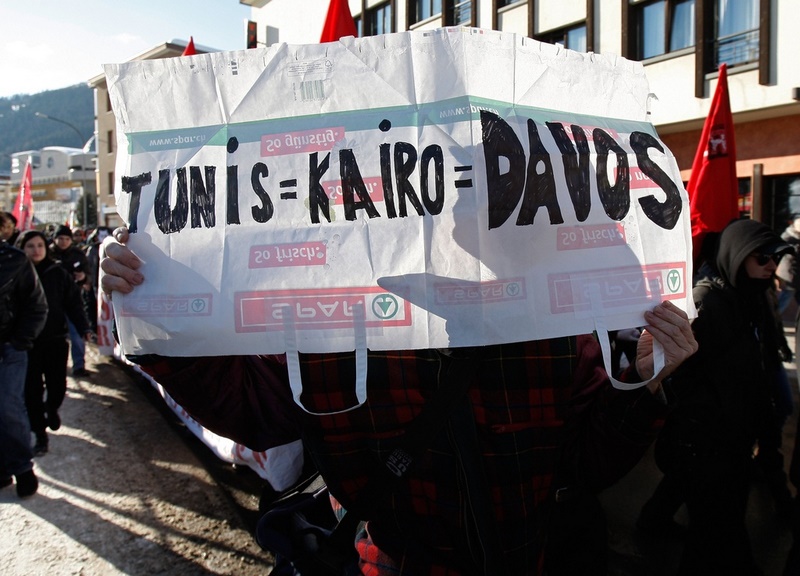Swiss newspapers chart Egypt’s turmoil

With protests continuing in Egypt against President Hosni Mubarak, the country’s future lies in the hands of the army, Swiss newspapers agree.
“Mubarak’s regime lies in tatters,” wrote Zurich’s Tages-Anzeiger on Monday, the seventh day of demonstrations across the country calling for democratic reforms and in protest against Mubarak’s 30-year regime.
Describing the situation on the ground, the newspaper said: “Egypt is caught in a painful vacuum between a dictatorship and something new, from which everyone hopes things will turn out better than before. It is unclear which side the army will take.”
Unrest and instability in cities is attracting people from all strata of society.
“The poorest of the poor are coming out of the slums. They are stealing what they could never afford. There are destroying 5,000-year-old statues in the Egyptian Museum. They are shooting. The Facebook revolt threatens to turn into looting led by the barefoot masses,” wrote a Tages-Anzeiger correspondent in Cairo.
“The government prefers that the media reports on the looting rather than political reforms. It’s a way of making people forget that more than 100 people have already been killed within a couple days,” noted the Fribourg-based newspaper La Liberté.
The newspaper commented that the protests were reaching the “point of no return”.
“It’s over, Mubarak”
Scenes on the ground may be chaotic, but they are leading in one clear direction, according to a Basler Zeitung correspondent.
“Not even a bloodbath will prevent 80 million Egyptians from reaching their long-term goal of creating a democratic state.”
And like the placards in the streets, Swiss newspapers have also sent messages to Egypt’s leader.
“The people won’t give up,” said a headline in the Basler Zeitung.
“It’s over, Mubarak!” said the Blick tabloid. Commenting on his appearance on state television, the newspaper comments that “Mubarak suddenly looks very old, despite the dyed hair”.
Sacrifice
According to the Tages-Anzeiger, Mubarak’s strategy may be to take his people and the country with him, if he goes down. “This way he can discredit the revolt that cost him his place.”
The overwhelming consensus is that Egypt’s fate now lies in the hands of the military.
“Only one power in Egypt is promising real security: the army. The demonstrators should not forget this. Low-flying jets thundered over Cairo yesterday, to remind them loudly of this” wrote the Blick correspondent Thomas Ley from the city.
Le Temps noted that despite its decline, the Egyptian army remains strong. It wrote that in response to the demonstrations, military chiefs need to quickly draw up electoral plans and assure the public that Mubarak’s family will withdraw from power “in one way or another”.
“It therefore needs to sacrifice Mubarak for the system of which it is once again the main pillar and thus guarantee stability. Will its leadership have this foresight? It’s not certain,” said Monday’s editorial.
“It seems that the army, under pressure from the Americans, are preparing the way towards transition, that of the scenario in Tunisia. One that Egypt needs.”
Leader-in-waiting?
The army will also have to decide what to do with Mubarak, the Tages-Anzeiger wrote: “Mubarak has missed the moment to do the population the favour of making an orderly departure.”
“If the army takes over, its officers will have to ask themselves what is more important: let Mubarak flee or bring him before the court like he should have been a long time ago.”
Profiling Mubarak’s new vice-president, 75-year-old Omar Suleiman – “Egypt’s grey eminence” – the Neue Zürcher Zeitung wrote that there has long been speculation that he could follow on from Mubarak.
The first vice-president to be appointed in 30 years, he would automatically succeed Mubarak in office if he were to flee or die.
“In light of his career and his ambition, it is not surprising that Suleiman is now officially moved up to the second-highest post in the country. Whether he can inherit this office from Mubarak or sink under the current political climate, time will tell,” the newspaper commented.
Six days of unrest in Egypt has killed more than 100 people and the two sides have reached a stalemate. Protesters refuse to go, while the army is not moving them.
After dissolving the government, President Hosni Mubarak named intelligence head Omar Suleiman as his vice-president, and minister of civil aviation Ahmed Shafiq, the new prime minister on January 29. Two days later a new cabinet was formed.
Mubarak’s vows to address public anger at rising prices, unemployment and huge gap between rich and poor have failed to halt their broader calls for a political ejection of Mubarak and his associates.
Many public buildings across the country have been torched.
The United States and Britain have called for an orderly transition to a more democratic system. An Egyptian opposition coalition that includes the mass Islamist movement the Muslim Brotherhood has turned to Mohamed ElBaradei, former head of the UN nuclear watchdog, to form a national unity government and make contact with the military.
The crisis in Egypt follows a revolt that toppled the leader of Tunisia two weeks ago, and a wave of popular anger sweeping other countries in North Africa and the Middle East.
In December 2008 the Swiss parliament made Egypt a key country for economic development cooperation.
Switzerland exports pharmaceuticals, machines, chemical primary products, and matchmaking wares, as well as optical and medical instruments to Egypt. In 2009 exports were SFr656 million ($696 million), imports around SFr109 million.
The most important exports from Egypt are: oil and gas products, crude oil, cotton, textiles, aluminium, iron and steel products and tourism.
Around 1,600 Egyptians live in Switzerland and around 1,400 Swiss live in Egypt.

In compliance with the JTI standards
More: SWI swissinfo.ch certified by the Journalism Trust Initiative













You can find an overview of ongoing debates with our journalists here . Please join us!
If you want to start a conversation about a topic raised in this article or want to report factual errors, email us at english@swissinfo.ch.